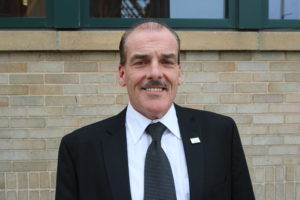April 2020 Feature Story – Patrick C.
Years of gradual drinking finally caught up to Patrick and when he had nowhere left to turn, he came to Helping Up Mission (HUM). Because of your generous donations, Patrick has grown spiritually, learned new life skills, and gotten out of his comfort zone.
Patrick, 32, was born in Catonsville, MD, and raised on a cul-de-sac in Howard County’s Ellicott City, MD. His parents separated and divorced when he was eight years old, spending weekends with his dad and the school week with his mom.
For Patrick, drinking was so gradual that there never was an “aha moment,” where he recognized his growing addiction. During high school, Patrick would often attend parties and drink to fit in. After graduation, “I took two years off from school but decided to go back because that’s what all of my friends were doing. I enrolled at Community College of Baltimore County (CCBC), but all my friends went to a different college. I would go to class and I would immediately start thinking about where the party was. Why was I sitting in class?” Patrick began missing classes, and as they added up, he dropped out of CCBC.
During this time Patrick acquired a job as a bartender. “At first I was a bar back. They put me in charge of carrying and stocking all the beer and liquor. Since I oversaw inventory, I would take sips out of bottles, restock them and count them as full. Soon I was coming into work hungover and drunk, and my coworkers noticed.
As his drinking progressed to full-blown alcoholism, Patrick was kicked out of his then girlfriends house and after looking for places to stay, ended up in a hotel. “I couldn’t find anything in my price range that would allow me to continue drinking. Sitting in my hotel room, fearing that my money would eventually run out. I didn’t know what I was going to do so I reached out to my parents and a few friends. Everyone was baffled as to what to do. They always say reach out for support, but no one was ready for it.
My father’s friend Marty finally stepped up and took me to Bayview Hospital for detox. He told my father that I was trying to change my life and he (my dad) needed to step up. So, my father picks me up from the hospital, takes me out for breakfast, and then drives me to HUM. The first week was hell. I got emotional, hid in a bathroom stall, and cried. I realized that I did have a bad problem, but I was in a place where I could finally take care of some things.
The first couple of months at HUM were great. Everything is taken care of for you. You don’t have to worry about anything, except for going to appointments, class, and work therapy. You are here for yourself. Before HUM, when I would deal with stressful situations, I could drink. Now I take a second, process the situation, and then deal with them. I’ve learned patience, which has helped me in my relationships. My dad and stepmom both said they were happy for me to become a productive member of society. I used to take offense to that, I thought a bartender does exactly that, he gives people what they want. But I now see where they are coming from and look forward to living the “American Dream.”
The program helped me spiritually through the classes. I’m not necessarily a Bible guy, but I have always believed in a higher power. My grandmother taught us about the bible, but the classes taught me to see things from a different perspective. Everyone wants to be a good productive person, but unless they think about it differently, they are thinking about it like an addict or alcoholic. Through the program, I have also taken part in the choir, equine therapy, and attended weekend outings at Camp Wabanna. It was nice to just get away for the weekend and have a break from the daily structure at HUM.
Patrick’s final work therapy assignment was with HUM’s IT department. “I have always wondered how things work and the thought processes associated with technology. As an intern in the IT department, I take care of all the electronics, computers, scanners, and help solve problems when something goes down. Recently, I started putting out my application and accepted an IT position at a company in Tampa, Florida. After graduation, I will spend a week with my father and then move down to Florida with my mother and start my new job.
Thanks to generous contributions from people like you, Patrick has gotten out of his comfort zone. I realize that life-transformation is never too late. At HUM, you can find the drive to see the light at the end of the tunnel. You must make decisions that will benefit you and help you get there. So, if you do hit rock bottom, and have nowhere left to turn, come to Helping Up Mission. You will not be by yourself. Getting out of your comfort zone is one of the most vital things you can do for your recovery. Because if you go back into your comfort zone, you’re never going to change!
